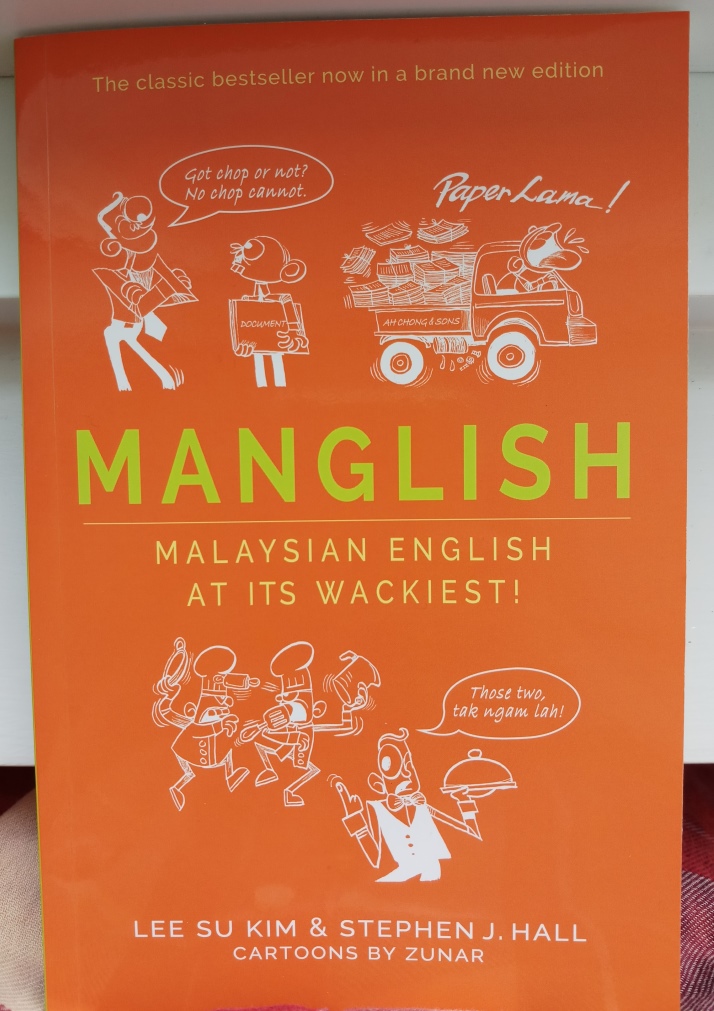Review written by Marshall Cavendish and Sarah Anne Lee.
The spoken language of a predominantly non-English nation can take on fascinating forms when integrated with the current lingua franca of the world. And with a multicultural country such as Malaysia, where three main languages of Chinese, Malay, and Tamil, and numerous dialects of each main language carry their own sets of expressions, terminology, and phrasing—the resulting mangling with attempts to master the language of global business becomes something unique, a form known as Manglish.
Compiled from smatterings of conversations overheard in the most Malaysian places of gatherings and fun (none other than the kopitiam), Malaysian educator, author, and cultural activist Lee Su Kim presents a second edition of her classic presentation of Malaysia’s unique rojak (tossed salad) language.
With a collaboration alongside Professor Stephen J. Hall, the Head of Sunway University (Malaysia)’s English Language Studies Centre, this book is a definitive guide for the lost backpacker, future resident, or businessperson looking to connect with the locals using their most excited or lackadaisical ramblings.
The glossary of colloquial Manglish terminology is accompanied by both a basic explanation of what it means, how it is used, and on some pages are accompanied with entertaining illustrations by infamous cartoonist Zunar, done prior to his conviction under sedition charges of making a clown of then-Prime Minister Najib Razak.
While the simple dictionary provides an extensive lexicon of many still-used words and exclamations in today’s population, there are quite a few mixed in that doesn’t strike familiar even to the local reader due to generational differences and historical irrelevancy. Nevertheless, the collection is a compact insight into how the formal English language is understood yet utilised differently according to different cultures. The vice versa is also shown, with some idioms from the Chinese and Malay cultures having carried over into the everyday offhand commentary.
The Malaysian usage of English is shown to be a rather straightforward process, relying more on meaning than grammar. As such, expressions such as ‘where got’ to indicate bewilderment, denial, or disbelief, or the singular expression ‘Best!’ to voice out satisfaction displays simple yet widely understood notions. Likewise, the habitual usage of singular words from other languages like the Cantonese ‘tapau’ for takeaway, or Malay ’belanja’ that means to treat or paid for, show just how easy it is to pick up the language(s) in a matter of simple general understanding.
There is even a section dedicated to the various sounds Malaysians tend to end their sentences with, such as ‘lah’, ‘leh’, or ‘wan’, explaining the delicate usage each is appropriated to, not just habitual grunts to round up a sentence.
It is evident that through Manglish, the very real collapse of several language barriers at once can be heard, and illustrated in hilarious but real usage by Malaysians from every walk of life. Forget about tenses, grammar, pronunciation, and just relek lah … so would a true Malaysian say with the often exasperation of Aiyoh to hurry you on (yes, the irony). Manglish or Malaysian English is what Malaysians speak when we want to connect with each other or just hang loose. Borrowing from Malay, Chinese, Indian, Asli, British English, American English, dialects, popular mass media, and plenty more, our unique “English” reflects our amazing diversity.
Manglish: Malaysian English At Its Wackiest is available for purchase at Times bookstore and via other Marshall Cavendish distributors in Malaysia and Singapore.
"ExpatGo welcomes and encourages comments, input, and divergent opinions. However, we kindly request that you use suitable language in your comments, and refrain from any sort of personal attack, hate speech, or disparaging rhetoric. Comments not in line with this are subject to removal from the site. "























